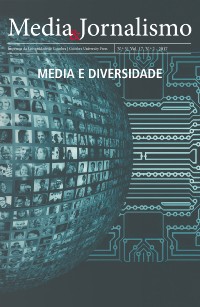Please use this identifier to cite or link to this item:
https://hdl.handle.net/10316.2/93464| Title: | Rádio e inclusão: uma análise de experiências de rádio para surdos em Portugal | Other Titles: | Radio and inclusion: an analysis of radio for deaf people experiences in Portugal | Authors: | Bonixe, Luís | Keywords: | radio;deaf people;inclusion;Antena 1;TSF;rádio;surdos;inclusão;Antena 1;TSF | Issue Date: | 2017 | Publisher: | Imprensa da Universidade de Coimbra | Abstract: | A rádio adquiriu um conjunto de novas ferramentas em virtude da sua migração para as plataformas digitais e, em concreto, para a Internet. Como defendem vários autores, falar hoje de rádio, significa considerar este como um meio multimedia e multiplataforma. A partir deste pressuposto, abrem-se novos caminhos para a rádio, quer no que toca ao acesso, quer em relação à captação de novos públicos que estavam afastados deste meio. A comunidade surda integrava naturalmente esse público incapacitado para escutar mensagens exclusivamente sonoras. Cenário que se alterou com esta “nova rádio”. Em 2005 e 2013 a TSF e a Antena 1, respetivamente, realizaram duas emissões de rádio com tradução para Língua Gestual Portuguesa. O presente artigo procura analisar essas duas experiências e lançar uma reflexão sobre o papel da rádio enquanto meio de inclusão da pessoa com deficiência e em particular dos surdos. Radio has acquired a number of new tools by virtue of its migration to digital platforms and in particular to the Internet. As argued by several authors, speaking today of radio means to consider this as a multimedia and multiplatform medium. From this assumption, new paths for the radio are opened, both in terms of access and in relation to the capture of new audiences that were far from this medium. The deaf community naturally integrated this audience since it was incapable to listen to sound messages. Scenario that changed with this “new radio”. In 2005 and 2013 the TSF and Antena 1, respectively, made two radio broadcasts with translation into Portuguese Sign Language. The present article seeks to analyze these two experiences and to reflect on the role of radio as a means of inclusion of the disabled person and in particular of the deaf. |
URI: | https://hdl.handle.net/10316.2/43226 | ISSN: | 1645‑5681 2183-5462 (digital) |
DOI: | 10.14195/2183-5462_31_4 | Rights: | open access |
| Appears in Collections: | Media & Jornalismo |
Files in This Item:
| File | Description | Size | Format | |
|---|---|---|---|---|
| radio_e_inclusao.pdf | 2.08 MB | Adobe PDF |  |
Items in DSpace are protected by copyright, with all rights reserved, unless otherwise indicated.
